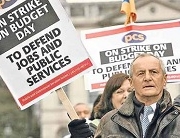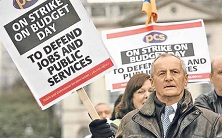Should christian doctors and nurses strike?
Over the last few days, health unions have been meeting to decide whether they will begin preparations for coordinated industrial action over the autumn and winter in response to the government’s proposals on NHS staff pensions.
The BMA, RCN, UNISON, Managers in Partnership Unite and GMB have been meeting to decide if, when and how they respond to the government’s proposals for increased pension contributions and the ending of final salary pension schemes. One of the options on the table appears to be the option to strike, although the RCN was playing that down, and other unions were holding this as a last option if talks break down over the autumn. The aim seems to be to make sure that contingency plans are in place so that industrial action will not harm patient care.
While it is somewhat unprecedented to see all the unions representing NHS staff working together like this, and to be talking openly about the possibility of industrial action before talks have even resumed seems calculated to get government hackles up, it does raise a very real question. Should health professionals ever consider striking? And if so, in what circumstances?
The arguments about the pensions issue are fairly well covered in an opinion piece in last month’s Prospect, and in the links to the various union websites above, so there is no need to rehearse them here.
All concerned claim that they do not want to see patients suffer, and that must always be our primary concern as health professionals. But is it right to strike, even as a last resort and even with safeguards in place?
Christians have, historically, joined with others in taking direct, peaceful action when a cause was perceived to be just – the bus strikes in Alabama during the early years of the civil rights movement in the sixties and the Christian groups that joined in the anti-war protests over second Gulf War, to name but two. So there is clear, historical precedent.
But are NHS pensions in the same league though? If we have good grounds to believe that some of our colleagues are going to be left far worse off, even destitute as a result of these measures, then maybe the answer is a qualified ‘yes’. However, that is by no means certain. On the other hand, if we are all going to have to pay more and work longer than we expected to have a reasonable (or even comfortable) retirement income, is that really a major injustice, or just learning to live with the new economic realities of the decade?
And as professionals, should we ever let our own interests come first, potentially disadvantaging our patients?
There are no obvious answers. But, in an environment where many NHS staff feel over stretched in understaffed wards, where cuts in patient services are adversely affecting our patients and local communities, and where the future of much valued services is in question with planned structural reforms, it is understandable that this is the kind of issue that may the last straw on the camel’s back before it breaks.
Let us hope and pray that sense prevails and a fair resolution is found before anyone has to make this choice.











Leave a Reply
Want to join the discussion?Feel free to contribute!